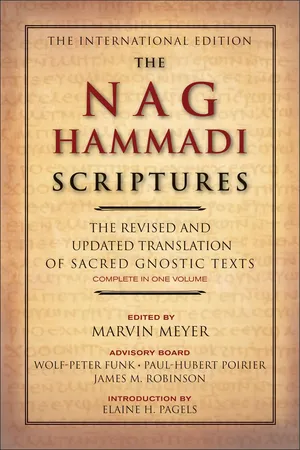
The Nag Hammadi Scriptures
The Revised and Updated Translation of Sacred Gnostic Texts Complete in One Volume
- 864 pages
- English
- ePUB (mobile friendly)
- Available on iOS & Android
The Nag Hammadi Scriptures
The Revised and Updated Translation of Sacred Gnostic Texts Complete in One Volume
About this book
The Nag Hammadi Scriptures, edited by Marvin Meyer, is the most complete, up-to-date, one-volume, English-language edition of the renowned library of Gnostic manuscripts discovered in Egypt in 1945, which rivaled the Dead Sea Scrolls find in significance. It includes the Gospel of Thomas, the Gospel of Mary, and the recently discovered Gospel of Judas, as well as other Gnostic gospels and sacred texts. This volume also includes introductory essays, notes, tables, glossary, index, etc. to help the reader understand the context and contemporary significance of these texts which have shed new light on early Christianity and ancient thought. The compilation of ancient manuscripts that constitute The Nag Hammadi Scriptures is a discovery that challenges everything we thought we knew about the early Christian church, ancient Judaism, and Greco-Roman religions.
Tools to learn more effectively

Saving Books

Keyword Search

Annotating Text

Listen to it instead
Information
About the Publisher
Table of contents
- Dedication
- Contents
- Preface James M. Robinson
- Introduction: Marvin Meyer and Elaine H. Pagels
- THE PRAYER OF THE APOSTLE PAUL: Madeleine Scopello and Marvin Meyer
- THE SECRET BOOK OF JAMES: Madeleine Scopello and Marvin Meyer
- THE GOSPEL OF TRUTH: Einar Thomassen and Marvin Meyer
- THE TREATISE ON RESURRECTION: Einar Thomassen and Marvin Meyer
- THE TRIPARTITE TRACTATE: Einar Thomassen
- THE SECRET BOOK OF JOHN: John D. Turner and Marvin Meyer
- THE GOSPEL OF THOMAS WITH THE GREEK GOSPEL OF THOMAS: Marvin Meyer
- THE GOSPEL OF PHILIP: Madeleine Scopello and Marvin Meyer
- THE NATURE OF THE RULERS: Marvin Meyer
- ON THE ORIGIN OF THE WORLD: Marvin Meyer
- EXEGESIS ON THE SOUL: Madeleine Scopello and Marvin Meyer
- THE BOOK OF THOMAS: John D. Turner and Marvin Meyer
- THE HOLY BOOK OF THE GREAT INVISIBLE SPIRIT: John D. Turner and Marvin Meyer
- EUGNOSTOS THE BLESSED: Madeleine Scopello and Marvin Meyer
- THE WISDOM OF JESUS CHRIST: Madeleine Scopello and Marvin Meyer
- THE DIALOGUE OF THE SAVIOR: Madeleine Scopello and Marvin Meyer
- THE REVELATION OF PAUL: Madeleine Scopello and Marvin Meyer
- THE FIRST REVELATION OF JAMES: Wolf-Peter Funk
- THE SECOND REVELATION OF JAMES: Wolf-Peter Funk
- THE REVELATION OF ADAM: Madeleine Scopello and Marvin Meyer
- THE ACTS OF PETER AND THE TWELVE APOSTLES: Madeleine Scopello and Marvin Meyer
- THUNDER: Paul-Hubert Poirier and Marvin Meyer
- AUTHORITATIVE DISCOURSE: Madeleine Scopello and Marvin Meyer
- THE CONCEPT OF OUR GREAT POWER: Madeleine Scopello and Marvin Meyer
- EXCERPT FROM PLATO’S REPUBLIC: Marvin Meyer
- THE DISCOURSE ON THE EIGHTH AND NINTH: Jean-Pierre Mahé and Marvin Meyer
- THE PRAYER OF THANKSGIVING: Jean-Pierre Mahé and Marvin Meyer
- EXCERPT FROM THE PERFECT DISCOURSE: Jean-Pierre Mahé and Marvin Meyer
- THE PARAPHRASE OF SHEM: Michel Roberge
- THE SECOND DISCOURSE OF GREAT SETH: Marvin Meyer
- THE REVELATION OF PETER: Marvin Meyer
- THE TEACHINGS OF SILVANUS: Birger A. Pearson
- THE THREE STELES OF SETH: John D. Turner
- ZOSTRIANOS: John D. Turner
- THE LETTER OF PETER TO PHILIP: Marvin Meyer
- MELCHIZEDEK: Birger A. Pearson
- THE THOUGHT OF NOREA: John D. Turner and Marvin Meyer
- THE TESTIMONY OF TRUTH: Birger A. Pearson
- MARSANES: John D. Turner
- THE INTERPRETATION OF KNOWLEDGE: Einar Thomassen
- VALENTINIAN EXPOSITION WITH VALENTINIAN LITURGICAL READINGS: Einar Thomassen and Marvin Meyer
- ALLOGENES THE STRANGER: John D. Turner
- HYPSIPHRONE: John D. Turner and Marvin Meyer
- THE SENTENCES OF SEXTUS: Paul-Hubert Poirier and Marvin Meyer
- THREE FORMS OF FIRST THOUGHT: John D. Turner
- THE GOSPEL OF MARY WITH THE GREEK GOSPEL OF MARY: Karen L. King
- THE ACT OF PETER: Marvin Meyer
- THE GOSPEL OF JUDAS: Marvin Meyer
- THE BOOK OF ALLOGENES: Marvin Meyer
- Epilogue: Schools of Thought in the Nag Hammadi Scriptures
- Table of Tractates
- Bibliography
- Acknowledgments
- Searchable Terms
- About the Author
- Books by Marvin W. Meyer
- Copyright
- About the Publisher
Frequently asked questions
- Essential is ideal for learners and professionals who enjoy exploring a wide range of subjects. Access the Essential Library with 800,000+ trusted titles and best-sellers across business, personal growth, and the humanities. Includes unlimited reading time and Standard Read Aloud voice.
- Complete: Perfect for advanced learners and researchers needing full, unrestricted access. Unlock 1.4M+ books across hundreds of subjects, including academic and specialized titles. The Complete Plan also includes advanced features like Premium Read Aloud and Research Assistant.
Please note we cannot support devices running on iOS 13 and Android 7 or earlier. Learn more about using the app